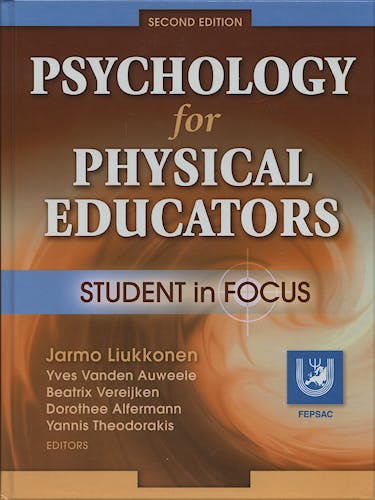

No hay productos en el carrito



Psychology for Physical Educators Student in Focus
Liukkonen J.
2ª Edición Febrero 2007
Inglés
Tapa dura
312 pags
1500 gr
23 x 29 x 2 cm
ISBN 9780736062404
Editorial HUMAN KINETICS BOOKS
Enhancing children’s positive attitudes toward physical education and creating a motivationally favorable atmosphere are now considered as important as developing other aspects of physical fitness. Psychology for Physical Educators, Second Edition, gives physical educators the psychological knowledge and practical guidelines necessary for realizing current curriculum goals.
Unlike the general textbooks on educational psychology that are currently available, Psychology for Physical Educators, Second Edition, relates directly to the physical education domain. It offers physical educators practical ideas and pedagogical solutions that work in diverse settings, such as in the gym, on the field, on the court, and on the ice. The text also accounts for the various psychological needs that arise when students are physically active and competing with each other, as opposed to sitting behind their desks.
Psychology for Physical Educators,, Second Edition, is written by a team of 29 European sport psychology and physical education experts from seven countries. It presents readers with a broad overview of psychology as it applies to physical education.
The book is structured around common curriculum goals identified by the European Federation of Sport Psychology (FEPSAC): fitness, health, safety, psychomotor competence, positive self-perception, and social development. The text is divided into four parts:
• Part I: Promotion of Lifelong Health and Fitness
• Part II: Promotion of Social Skills for Life
• Part III: Promotion of Self-Concept and Cognitive Skills
• Part IV: Promotion of Motor Skills for Life
The chapters have been updated from the first edition to include even more practical examples and tools for physical educators. Each chapter also contains objectives, examples, key points, review questions, questionnaires, summaries, and key terms, making this text an invaluable teaching aid.
Psychology for Physical Educators, Second Edition, helps physical education teachers and coaches understand and apply psychological principles to benefit students and participants at all levels.
About the Editor
Jarmo Liukkonen, PhD, is professor of sport pedagogy at the University of Jyvaskyla, Finland, and deputy head of the department of sport sciences, in charge of research and education of doctoral students. He was a member of the managing council for the European Federation of Sport Psychology (FEPSAC) from 1991 to 2003. He is currently president of the Finnish Association of Sport Psychology and works as a psychological consultant to several Finnish national sport teams. His research interests include motivational climate in school physical education, psychosocial determinants of physical activity, physical activity, and psychological well-being.
Yves Vanden Auweele, PhD, is professor emeritus of psychology at Katholieke Universiteit Leuven in Belgium. Since 1980 he has taught psychology to physical education and psychology students and has been the Belgian co-coordinator of the European Masters Programme for Exercise and Sport Psychology. He was president of the Belgian Society of Sport Psychology and also a member of the managing council for the European Federation of Sport Psychology (FEPSAC) from 1991 to 1999. He has published on many sport and exercise psychology topics, including promoting physical activity in sedentary adults, personality of the elite performer, dysfunction versus optimal functioning of elite athletes, and judging bias in aesthetic sports relying on the subjective evaluation of a panel of judges.
Beatrix Vereijken, PhD, is professor and head of the department of human movement science at the Norwegian University of Science and Technology. With a formal background in experimental psychology, developmental psychology, and human movement science, she covers a range of research topics including complex motor skill acquisition, movement coordination dynamics, balance and gait in infants and the elderly, and changes in force control with age.
Dorothee Alfermann, PhD, is a professor of sport and exercise psychology at the University of Leipzig, Germany. She is a former vice president of the International Society of Sport Psychology and, since 2001, co-editor in chief of Psychology of Sport and Exercise, an official journal of the European Federation of Sport Psychology (FEPSAC). Her research topics include career transitions and career termination, physical self-concept, coach–athlete interaction, and gender roles and gender identity.
Yannis Theodorakis, PhD, is professor of sport psychology in the department of physical education and sport science at the Uni¬versity of Thessaly, Greece. He was elected a member of the managing council for the European Federation of Sport Psychology (FEPSAC) from 1999 to 2003, head of his department, and president of the Greek Society of Sport Psychology. He is currently on the editorial board of Psychology of Sport and Exercise journal and editor of Inquiries in Sports and Physical Education. He has published six books and more than 150 articles in Greek and international journals covering topics such as goal setting, self-talk, attitude and behavior relationships, injury rehabilitation, and health psychology.
Table of Contents
Preface
Section I: Promotion of Lifelong Health and Fitness
Chapter 1. Establishing a Positive Motivational Climate in Physical Education
Chapter 2. Goal Setting in Physical Education
Chapter 3. Measuring Perceived Motivational Climate in Physical Education
Chapter 4. Experience of State Anxiety iIn Physical Education
Section II: Promotion of Social Skills for Life
Chapter 5. Social and Emotional Learning in Physical Education
Chapter 6. Facilitating Prosocial Behaviour in Physical Education
Chapter 7. Group Development in the Physical Education Class
Section III: Promotion of Self-Concept and Cognitive Skills
Chapter 8. Promotion of a Healthy Self-Concept
Chapter 9. Self-Regulation and Strategic Learning: The Role of Motivational
Beliefs and
The Learning Environment in Physical Education
Chapter 10. Interdisciplinary Teaching, Multiple Goals and Self-Concept
Section IV : Promotion of Motor Skills for Life
Chapter 11. Promoting Motor Learning in Young Children Through Landscapes
Chapter 12. Promoting Motor Skills in School Children and Adolescents
Chapter 13. Visuomotor Control of Movement Acquisition
Chapter 14. Core-Based Motor Teaching
Index
About the Editors
Audiences
Textbook for physical education psychology courses. Reference for teachers,
curriculum specialists, youth sport coaches, and other physical education professionals.
© 2025 Axón Librería S.L.
2.149.0